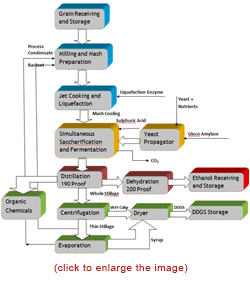Products we deals in

Ethanol
Ethanol or Ethyl Alcohol can be produced through biological or synthetic route that contains sugar or chemical materials. Most of the Ethanol is currently distilled primarily from Starch and sugar feedstocks such as corn and wheat, molasses etc. Ethanol can also be produced from biomass/cellulose materials such as agricultural and wood wastes, and fast-growing trees and grasses, although cellulosic ethanol technologies are still under development and are not yet cost-competitive. Ethanol is being produced as hydrous and anhydrous and being used based on specific application. There are number of co-products can be produced during the Ethanol production process, which adds lot of value to such production units.
- Ethanol is also a high-performance motor fuel that cuts poisonous exhaust emissions and is environment friendly. Anhydrous Ethanol is being used as Motor fuel.
- Ethyl Alcohol is also used as potable alcohol, the active ingredient in beer, wine and spirits. Hydrous Ethanol is being used for this application.
- Ethanol also can be used as an intermediate to produce number of other organic chemicals such as acetic acid, ethyl acetate and acetic
Feedstocks
- Starch feedstocks – Wheat, Corn, Cassava and sorghum.
- Sugar feedstocks - Sugarcane, Sweet Sorghum, Beet root and Molasses.
- Biomass – Baggasse, Straw, MSW, Wood waste and Industrial waste.

Biodiesel
Biodiesel is an oil/fat consisting of long chain alkyl esters. It can be produced through chemical reactions of oil and fats in presence of a catalyst. The feedstocks to produce biodiesel include Canola, Palm, Jatropha, Animal fat and cooking oil etc. The process of converting these feedstocks into Biodiesel called “Trans-esterfication” and the product is called FAME (Fatty Acid Methyl Ester). Glycerine and free fatty acids are the by-products of the biodiesel Production Process.
Biogas
Biogas is produced by the anaerobic digestion or fermentation of organic/biodegradable matter. Biogas originates from any biogenic material and is also a type of biofuel. The sources to produce biogas include manure, sewage, municipal waste, Industrial waste. Biogas comprises primarily methane and carbon dioxide. Biogas production reduces high pollutant load from the waste materials. Biogas is being used as a fuel sources to operate industrial boilers and turbine to generate the power. Biogas is considered a very good source as a renewable energy.
Cellulosic Ethanol
Ethanol produced from any biomass source. Biomass composed mainly of cellulose, hemi-cellulose and lignin. Sugarcane Baggsse, Rice Husk, Corn stover, switchgrass, miscanthus, woodchips and the byproducts of lawn and tree maintenance are some of the more popular cellulosic materials for ethanol production.
- Acid Hydrolysis.
- Inorganic catalytic conversion of Syn Gas.
- Fermentation of Syn gas using specific microbial strain.
- Integrated Enzymatic Hydrolysis.
Algae as a source of Biofuel
Spectrum is working on development of a Integrated Model where Algae can be used as a primary feedstock to produce Biodiesel, Ethanol and other co-products.
Biopolymers
Biopolymers are polymers produced by using micro-organisms. Spectrum is working on technologies to produce PLA (Poly Lactic Acid is known as Bioplastic). We are also working on renewable Polyethene production from Biomass.
Industrial Enzymes
Enzymes are the Protein molecules that catalyze the chemical/biochemical reactions. In such enzymatic reactions, the molecules at the beginning of the process are called substrates, and they are converted into different molecules, called the products. Spectrum is working on specialty enzymes used in Cellulosic Ethanol production and other applications.
Nutritional Supplements (Natural Health Products)
Nutritional Supplements are derived from natural plant or other sources which supplement the diet and provide nutrients, such as vitamins, minerals, fiber, fatty acids, or amino acids, that may be missing or may not be consumed in sufficient quantities in a person's diet. These are natural health products.
